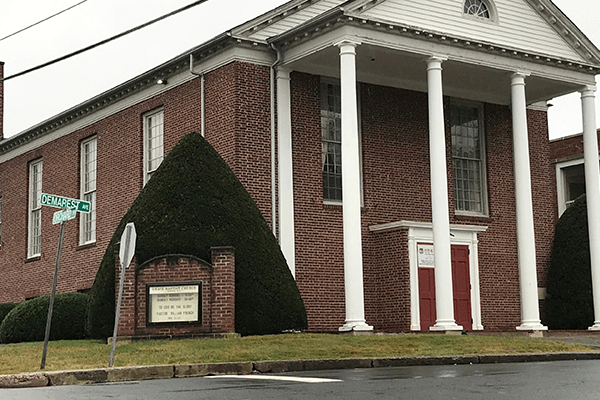|
RCBJ-Audible (Listen For Free)
|
If Town Super-Majority Law Is Deemed Illegal In Hoehmann’s Term Limits Fight, Entire Nanuet TOD Law May Be In Jeopardy
By Tina Traster
Perhaps third time’s the charm. The Town of Clarkstown, which has twice been turned down, is angling for a state grant to demolish a church and other outbuildings on a Nanuet property the town purchased several years ago after a pitched battle over the sale to a religious girls school.
The town council on Tuesday voted unanimously to apply for a $1 million state grant under the Restore New York Communities Initiative to demolish the Grace Baptist Church to make way for a one-acre municipal parking lot and a non-specific future mixed-use housing project that for now is theoretical.
In 2020, the town purchased the Grace Baptist Church in Nanuet for $4.5 million for “general municipal purposes.” There has been no development activity since the purchase was completed but the town has applied to the state twice unsuccessfully for a $1 million grant for demolition of the decaying and environmentally contaminated structures.
While the application is a hopeful endeavor to help move the blighted site forward, town officials could face more than one obstacle. To begin, town officials said last week that the grant application presumes a mixed-use development with multi-family housing of up to 110 housing units on the two remaining acres after one acre is parceled off for a parking lot.
A careful read of the zoning code for that section of the Nanuet Transit Oriented Development (TOD) would not allow for 110 units on a site that size — even after allowances and incentives for affordable housing. The plan is not achievable without revising the TOD density in that zone.
And that raises the second thorny issue because the Nanuet TOD law passed in 2019 contains a provision whereby a super-majority vote (majority, plus one) is required to increase the total number of units in the TOD from 500 to 750.
The issue of the legality of a super-majority vote on Clarkstown laws has now become a subject of debate, and the cornerstone of pending litigation that focuses on whether super-majority votes are legal absent a public referendum.
Supervisor Hoehmann and Councilmember Don Franchino last month filed a lawsuit in Rockland County Supreme Court seeking to void the town’s term limit law claiming that the inclusion of super-majority provision to repeal the law renders the law illegal. Hoehmann also claims the super-majority provision cannot be severed from the law — that is, the entire law must fail because he claims any law passed that requires a super-majority to amend or repeal is only valid if it was passed by public referendum.
The TOD did not pass by public referendum.
Therefore, in a thorny twist, if Hoehmann prevails in his lawsuit, all the town’s laws requiring super-majorities would likely be voided as illegal, including the Nanuet TOD.
Meanwhile litigation surrounding the Grace Baptist Church site is still ongoing.
Ateres Bais Yaakov Academy of Rockland last month filed an appeal against the Town of Clarkstown, Clarkstown Supervisor George Hoehmann and CUPON (Citizens United to Protect Our Neighborhoods), requesting the appeals court overturn the District Court’s dismissal of its case against the Town of Clarkstown and George Hoehmann.
In its original suit at the District Court in White Plains, Ateres claimed it was thwarted in its efforts in late 2018 and 2019 to acquire the Grace Baptist Church site in Nanuet for use as a girls Yeshiva. It accused Hoehmann, the town, and CUPON of a concerted effort to undermine its ability to close the then-pending contract – claiming defendants had worked together to derail the yeshiva’s financing, building permit, zoning application, and contract with the church.
The District Court in White Plains dismissed the complaint in July saying Ateres “did not have standing” to assert its claims because Grace Baptist Church terminated the contract before the Town had a chance to rule on its zoning application, and Ateres had not adequately protected itself in its contract with the seller.
Ateres appealed that dismissal to the Second Circuit, arguing the District Court wrongly dismissed the suit. It charged the allegations in the complaint sufficiently stated a RLUIPA (Religious Land Use and Institutionalized Persons Act) claim, and the loss of the contract was “plainly traceable” to the bad acts of the town and Hoehmann. It also argued the court wrongly relied on lack of a final decision by the Town of Clarkstown’s Zoning Board, because it was plain that no opinion would ever have been issued.
If the town were to raze the property but Ateres were to prevail in the appeals, the town would be on the hook for compensatory damages and extensive legal fees.













